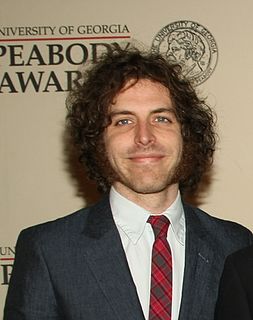A Quote by Jonathan Krisel
Things that people are doing constantly but aren't thinking about. That's the ultimate 'Portlandia' concept.
Related Quotes
I have always preferred the company of older people. No one in the history of the world has had less interest in the young than I do. I am not interested in what young people are thinking. They're thinking less than old people, of course. I mean, what could they be thinking? And what are they doing? They're doing the same stupid things you did.
We are constantly being surprised that people did things well before we were born. We are constantly remarking on the fact that things are done well by people other than ourselves. "The Japanese are a remarkable little people," we say, as if we were doing them a favor. "He is an Arab, but you ought to hear him play the zither." Why "but"?
When we came to the network, it was a very interesting time where Portlandia had just come on the air and had been very, very successful. I think people had Portlandia-sized expectations for Comedy Bang! Bang!, especially after the first episode was sampled by quite a large number of people. I remember getting the ratings after the first episode, and the network was over the moon about it. And then the second episode tanked so hard. Like, no one watched it. It was a resounding, "Hey, a bunch of people tried your show, and they all hate it!"
I would say the first key concept is that, in terms of technological and communication progress in human history, the Internet is basically the equivalent of electronic telepathy. We can now communicate all the time through our little magic smartphones with people who are anywhere, all the time, constantly learning what they're thinking, talking about, exchanging messages. And this is a new capability even within the context of the Internet.
I did sit in cinemas as a kid looking at English and American movies thinking, "Wouldn't it be great if the characters were like real people?" And the worst thing is films are constantly advertising themselves, drawing attention to their style of things. But actually I make films that I think are extremely sophisticated and cinematic. But you don't want the audience thinking about the bloody film. You want them to think about what's going on, and believe in it. Be flies on the wall, you know?





































